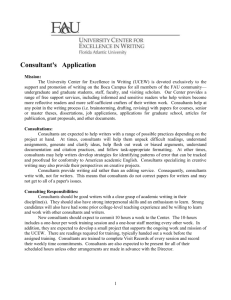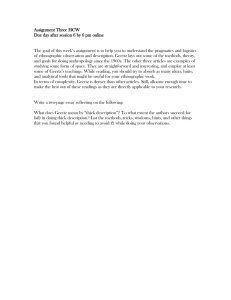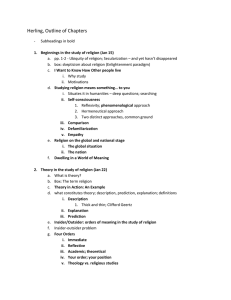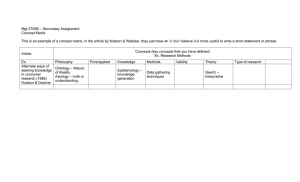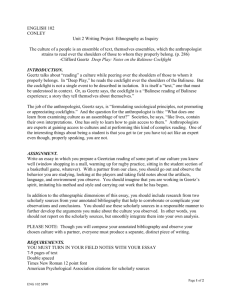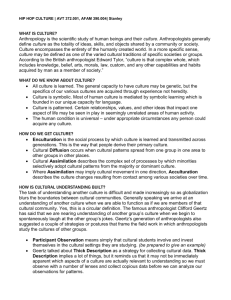Consultant's Application
advertisement
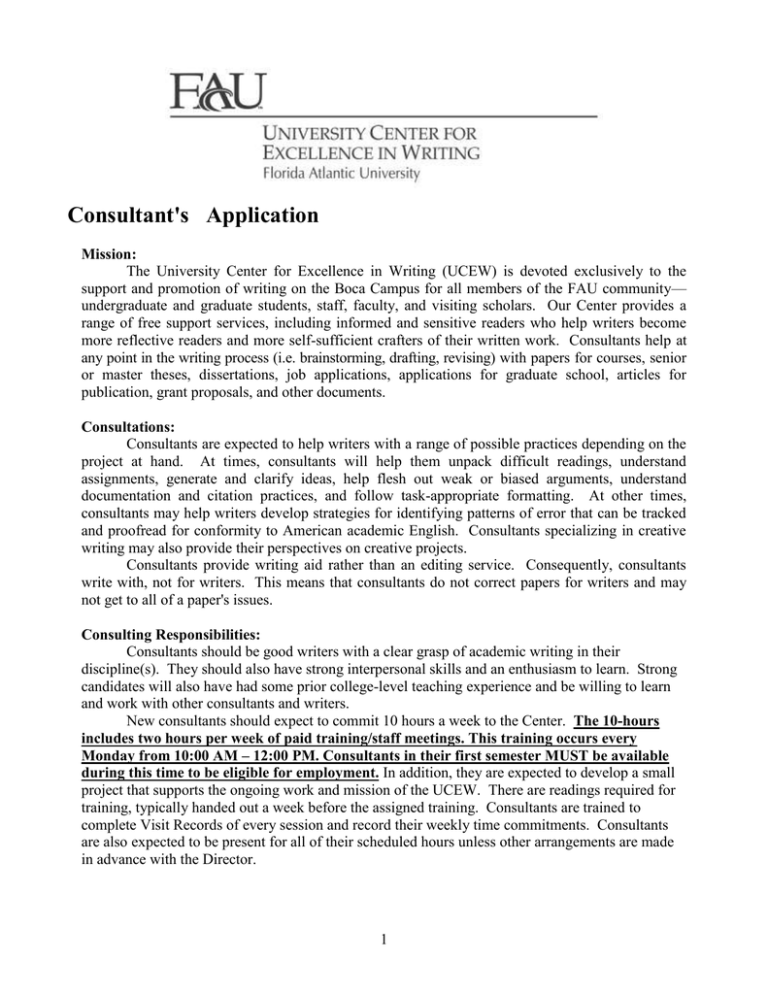
Consultant's Application Mission: The University Center for Excellence in Writing (UCEW) is devoted exclusively to the support and promotion of writing on the Boca Campus for all members of the FAU community— undergraduate and graduate students, staff, faculty, and visiting scholars. Our Center provides a range of free support services, including informed and sensitive readers who help writers become more reflective readers and more self-sufficient crafters of their written work. Consultants help at any point in the writing process (i.e. brainstorming, drafting, revising) with papers for courses, senior or master theses, dissertations, job applications, applications for graduate school, articles for publication, grant proposals, and other documents. Consultations: Consultants are expected to help writers with a range of possible practices depending on the project at hand. At times, consultants will help them unpack difficult readings, understand assignments, generate and clarify ideas, help flesh out weak or biased arguments, understand documentation and citation practices, and follow task-appropriate formatting. At other times, consultants may help writers develop strategies for identifying patterns of error that can be tracked and proofread for conformity to American academic English. Consultants specializing in creative writing may also provide their perspectives on creative projects. Consultants provide writing aid rather than an editing service. Consequently, consultants write with, not for writers. This means that consultants do not correct papers for writers and may not get to all of a paper's issues. Consulting Responsibilities: Consultants should be good writers with a clear grasp of academic writing in their discipline(s). They should also have strong interpersonal skills and an enthusiasm to learn. Strong candidates will also have had some prior college-level teaching experience and be willing to learn and work with other consultants and writers. New consultants should expect to commit 10 hours a week to the Center. The 10-hours includes two hours per week of paid training/staff meetings. This training occurs every Monday from 10:00 AM – 12:00 PM. Consultants in their first semester MUST be available during this time to be eligible for employment. In addition, they are expected to develop a small project that supports the ongoing work and mission of the UCEW. There are readings required for training, typically handed out a week before the assigned training. Consultants are trained to complete Visit Records of every session and record their weekly time commitments. Consultants are also expected to be present for all of their scheduled hours unless other arrangements are made in advance with the Director. 1 Requirements for the Applications: The UCEW application has several parts as outlined below. To become a UCEW consultant, please provide the following materials: 1) Contact information: o full name o mailing address o telephone numbers (including home and cell) o FAU email address 2) A one-paragraph description of relevant experience for the position and why you are interested in becoming a consultant 3) A one-paragraph statement of philosophy for one-on-one conferences with writers 4) A writing sample (ten page minimum) that demonstrates your writing abilities in your discipline 5) A résumé or CV 6) Written responses to two student papers that demonstrate your commenting style. The writing prompt for both student papers is on page three of this application. In this exercise, we’d like you to read the essays and imagine what your plan of action would be in a 25-minute consulting session. In your response, indicate the writing issues you would address and identify specifically the order in which you would address them. You may opt to handwrite your comments in the margins of each paper, or you may utilize the electronic comments feature of Microsoft Word. 7) Qualified candidates will be contacted to schedule an interview If you have any questions, please contact: Professor Jeffrey R. Galin, UCEW Director, at (561) 297-1221 or email him at jgalin@fau.edu Or Suzanne Sink, UCEW Assistant Director, at (561) 297-1017 or email her at ssink@fau.edu. 2 Assignment 3 Prompt A Writer’s Guide [Wideman, Geertz, Limerick] While John Edgar Wideman is not writing history or ethnography in “Our Time,” at least not in the strict sense of the term, he is writing about others and about the past—he is trying to recover, represent, and understand the story of his brother Robby, his family, and their neighborhood. He is trying to recover all those factors that might be said to have led to or produced his brother’s present situation. It is interesting to read “Our Time,” Clifford Geertz’s “Deep Play,” and Patricia Limerick’s “Haunted America” as alternate ways of thinking about the problems of history and ethnography. As you reread these selections, mark passages you might use to illustrate the styles, methods, and/or concerns of each writer. You should reread the essays as a group, as part of a single project investigating the problems of writing about other people and about the past. Each essay could be read as both a reflection on writing and a practical guide for those who follow. What do they say about method? What tips do they offer, directly or through their examples? What cautions? Write an essay in which you present, as though for a textbook or manual, a “Practical Guide for the Writer of History and Ethnography,” drawn from the work of Wideman, Geertz, and Limerick. 3 Student Paper #1 Wideman, Geertz, Limerick Assignment 3 Writing is an essential part of communication. Through writing people express their personal ideas and opinions. However, when one writes a history or ethnography, they must write in the perspective of the persons who participated in a specific culture or event. The writer can only express his ideas through analysis. The analysis must be accompanied by supporting evidence including, but not limited to, examples, statements, and numbers. By including various perspectives, the writing becomes more objective, providing a gateway for readers to think for themselves and analyze on their own. In Patricia Limerick’s essay, Haunted America, she writes a history of the Modoc Wars. “We cannot judge the events of the past by the standards of today (p 490).” Limerick is saying we must view things from the perspective of those that lived and participated in the events of any time period. Whatever may be considered good and is widely accepted during our lifetime could have been considered bad and unacceptable during another time period. One must allow himself to learn about the subject and be objective. Do not be confined to one side of a story. Take a look at it from all perspectives. This allows the reader to see these perspectives and which perspective they agree with. If it is subjective, the reader only sees one side of the story and it seems like they are being forced to agree with it when they really do not. In Clifford Geertz’s essay, Deep Play: Notes on the Balinese Cockfight, Geertz writes, “As he watches fight after fight…he grows more familiar with it and what it has to say to him (p.331).” Here Geertz is telling his readers that allowing themselves to be apart of the group helps one to get a better understanding of what is going on. A person who immerses their self in the study of the group or event being studied becomes familiar with the information and is able to be more objective and willing to accept the perspective of another. 4 John Edgar Wideman’s essay, Our Time, provides an overwhelming amount of insight concerning perspective. “You attempted to remove your ego, acknowledge the limitations of your individual view of things (p.761).” Wideman acknowledges the importance of being objective, but he also notes the difficulty in it. Although there is great effort to fully exclude subjective views, some way or another, information will be lost. There will be some point where the writer feels he must fill in the blanks that were left behind. One must try to remove all of their thoughts and opinions from whatever it is they are focusing on. Limerick, Geertz, and Wideman all address perspective as an important element to writing. Being objective gives the reader more room to draw their own conclusions and form their own ideas and opinions. 5 Student Paper #2 Wideman - Assignment 3 Wideman’s “Out Time,” Limerick’s “Haunted America,” and Geertz’s “Deep Play” all have different styles and methods of writing. The examples of their essays will help when writing an essay of your own. To start off, there are different points of view you could use. There is first person, which uses words such as I, me and my. Third person uses words like he, she, they and it. There is also an omniscient point of view, which tells a story from all sides, not using any particular words. Each of these view points is represented in the above mentioned essays. The best way to write is all-knowing or omniscient. When being omniscient in writing it helps to not be biased. You should always use as many sources as possible. It is also a great idea to observe the specific activity or group of people you are researching for your paper. There are many ways to do your observation. You should try different methods to obtain the most information. Being an outsider looking in and immersing yourself (being an insider) are two ways to start in observations. One example of looking in as an outsider can be found in Geertz’s “Deep Play.” Clifford Geertz was studying a culture in Bali. This particular excerpt is from Geertz’s observation of a Balinese cockfight. “In the midst of the third match, with hundreds of people, including, still transparent, myself and my wife, fused into a single body around the ring, a superorganism in the literal sense, a truck full of policemen armed with machineguns roared up” (Geertz 307). From this passage, you can see that he (Geertz) was looking in from the outside. He is also telling the story of how these people interact with each other. However, it is not always good to story tell, most of the time you just want to get your facts across to your readers. In the case of only using straight facts, you should observe and study from the inside. Surround yourself with the history you are researching. For example, Patricia Limerick offers this tip from her essay “Haunted America,” “Immerse yourself in the history of Indian-white wars, and 6 you gain one advantage that others around you will not have. Along with your neighbor and associates, you may well be disheartened by the alarming violence of the twentieth century…” (Limerick 496). With this tip, Limerick is trying to tell us the more history we are immersed in, the more knowledge we will gain about the topic we write on. Looking at everything from the inside gives more emotion to writing. You begin to feel more for the people, event or subject, when you see it from a different point of view. Although being an insider and an outsider may help as individual events, they can also be used together. This was demonstrated in the essay “Our Time” by John Edgar Wideman. In Wideman’s essay, you hear the voices of Robby Wideman (John’s brother), Wideman’s mother and John Wideman himself. The Wideman essay is a great example of how everyone’s versions of past events are collaborated into one essay. How would you like it if your side of the story was important, but the author did not care to include it? It is not ethical for a writer to be biased when writing about a subject. This is why we must research our history carefully. Make sure sources are reliable and always give your sources credit. Geertz gave credit to all forty-three of the sources he used (Geertz 333-339), as did Limerick to her thirty-nine sources (Limerick 503-504). A work cited should always be included at the end of the papers, in correct format. Even with the work cited and points of view, there is a major item to be cautious of, as Wideman tells us in his essay “Our Time”. “The hardest habit to break, since it was the habit of a lifetime, would be listening to myself listen to him” (Wideman 767). The author is trying to let us know that a story can become mixed up in a writer’s head. In other words, a writer may change around a story so much to improve their essay, that it won’t be true anymore. This must be carefully monitored to assure you do not write anything but the pure facts. A good writer always makes sure these needs are met to have an accurate, well-written paper. Through writing, one begins to understand the subject they discuss. Whether it be through 7 third person point of view or a first person view point everything will become clearer. What this means is that writing is a way to better perspicuity of the past. 8 Work Cited Geertz, Clifford. Deep Play (pgs 304-342) from Ways of Reading. Bedford/St. Martin’s. New York. 2002. Limerick, Patricia Nelson. Haunted America (pgs 469-507) from Ways of Reading. Bedford/ St. Martin’s. New York. 2002. Wideman, John Edgar. Our Time (pgs 750-792) from Ways of Reading. Bedford/St. Martin’s. New York. 2002. 9
